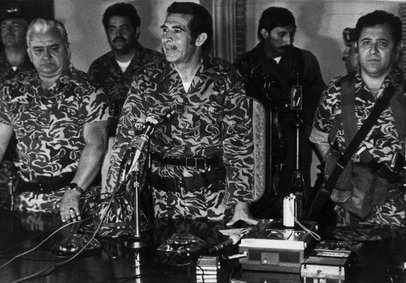
May 21, 2013 | News
El fallo emitido por la Corte de Constitucionalidad constituye un retroceso en la búsqueda de Justicia en Guatemala por las graves violaciones a los derechos humanos cometidas durante el conflicto armado interno, dijó la CIJ.
Es importante recordar que ya en diciembre de 2007, dos de los actuales magistrados de la Corte de Constitucionalidad también otorgaron un amparo al militar retirado General Ríos Montt, evitando su extradición a España. El día de ayer, la CC vuelve a amparar al militar retirado, esta vez para afectar gravemente el derecho de acceso a la justicia de las víctimas del Pueblo Ixil y provocar más impunidad en Guatemala.
Con este fallo, la Corte de Constitucionalidad envía un mensaje equivocado a la población guatemalteca y le da más poder a los victimarios. Sin embargo, la CIJ reconoce que tanto el Magistrado Chacón como la Magistrada Porras, emitieron un voto disidente, apartándose así de la decisión mayoritaria de los magistrados Molina Barreto, Maldonado Aguirre y Pérez Aguilera.
El amparo que la Corte de Constitucionalidad otorgó el día de ayer, lejos de respaldar la justicia, avala las acciones del abogado defensor Francisco García Gudiel, quien faltó a la ética profesional al aceptar la defensa de Ríos Montt, aún sabiendo que la Ley del Organismo Judicial en su artículo 201 literal a) le prohibía “actuar en los juicios en que el juez tuviere que excusarse o pudiera ser recusado a causa de la intervención del profesional.”
Ramón Cadena, Director de la Comisión Internacional de Juristas para Centroamérica expresó: «Nuevamente la Corte de Constitucionalidad está provocando el incumplimiento de la obligación internacional del Estado de Guatemala de juzgar y castigar a los responsables de crímenes gravísimos como el genocidio, crímenes de guerra y crímenes de lesa humanidad. Con dicho fallo, las víctimas del Pueblo Ixil han sido burladas y su derecho de acceso a la justicia ha sido nuevamente negado.»
Otros artículos:
La CIJ expresa su preocupación ante la posibilidad de que juicio por Genocidio y Delito contra los Deberes de Humanidad sea anulado
La CIJ celebra triunfo de la justicia sobre la impunidad
NOTE:
You can find a comprehensive background on the Rios Montt trial in English here
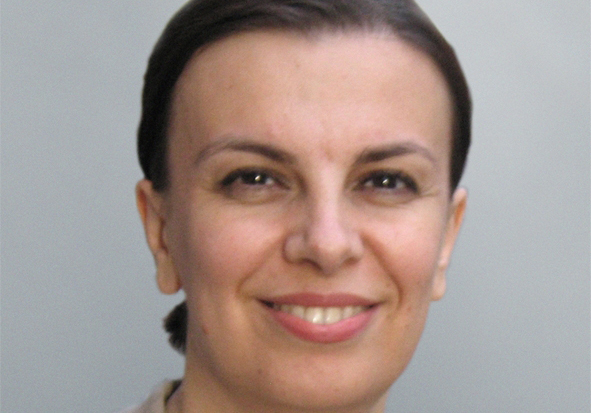
May 17, 2013 | News
On 16 May, the ICJ and Rechters voor Rechters (Judges for Judges) observed an appeal hearing at the Supreme Administrative Court (SAC) in a case against the dismissal of Judge Miroslava Todorova.
Judge Todorova, who had been serving on the Sofia City Court, is known for critical commentary on the problems in the judiciary in Bulgaria. In this hearing, the Prosecutor’s Office supported Judge Todorova’s appeal against her dismissal, but the Court has not yet issued its decision.
The ICJ previously raised concerns over Judge Todorova’s dismissal from her position of judge and as Chair of the Bulgarian Judges Association, in July 2012. The ICJ was particularly concerned at the disproportionate sanctions for delay of several reasoned cases, which is a problematic, but usual, practice among judges in Bulgaria.
The ICJ also expressed concern at the fact that the proceedings took place some six years after the limitation period ended. Further questions arose as to the composition of the Supreme Judicial Council (SJC), the body which both initiated the proceedings and conducted the hearing, and its independence in this case.
The trial observation mission consisted of Professor Doctor Günter Witzsch (Germany), who observed the trial on behalf of the ICJ, and Judge Janneke Bockwinkel (the Netherlands, on behalf of Judges for Judges). The ICJ and Judges for Judges will continue to follow the case of the dismissal of Judge Miroslava Todorova and will issue a detailed report following the issuing of the decision by the SAC.
For further information
Róisín Pillay, Director of the Europe Programme, roisin.pillay(a)icj.org
Temur Shakirov, Legal Adviser, Europe Programme, temur.shakirov(a)icj.org
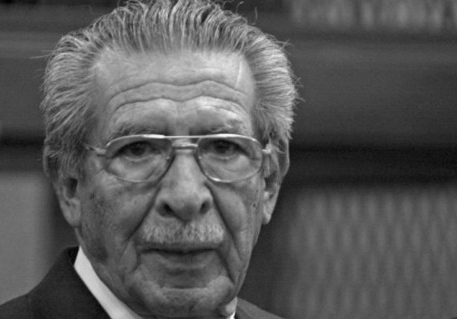
May 16, 2013 | News
La CIJ hoy expresó su preocupación ante la posibilidad de que la sentencia emitida días atrás por el Juzgado de Mayor Riesgo A en el juicio por Genocidio y Delito contra los Deberes de Humanidad sea anulada.
La CIJ tambien expresó su preocupación que el proceso contra el General Efraín Rios Montt (photo) por Genocidio y Delitos contra los Deberes de Humanidad tenga que repetirse.
La Corte de Constitucionalidad (CC) está examinando recursos legales planteados relacionados a la sentencia de 80 años de cárcel contra el exjefe de Estado.
Durante todo el juicio, los jueces del Tribunal recibieron presiones constantes, no solo de parte de los abogados de la defensa, sino que también de otros grupos externos que promueven más impunidad en este caso, dijó la CIJ.
Además, constantemente los abogados de la defensa presentaron diferentes recursos de amparo y otros recursos legales, con el único fin de obstaculizar el proceso y no permitir que se emitiera sentencia.
Frente a todos estos ataques, los jueces del Tribunal de Mayor Riesgo A demostraron una conducta intachable, apegada a derecho y con una firme determinación de terminar con la impunidad que ha existido alrededor de este caso.
Ramón Cadena, Director de la Oficina de la Comisión Internacional de Juristas para Centro América expresó: “Sería muy negativo para el Estado de Guatemala si se llega a anular la sentencia. La impunidad que ha existido ha hecho mucho daño a la población y a las víctimas quienes habían perdido la fe en la justicia.”
Finalmente, Cadena puntualizó: “Es más valioso que un Estado reconozca mediante una sentencia que se cometieron graves crímenes de guerra, de lesa humanidad y genocidio, a seguir escondiendo su responsabilidad con diferentes mecanismos de impunidad.”
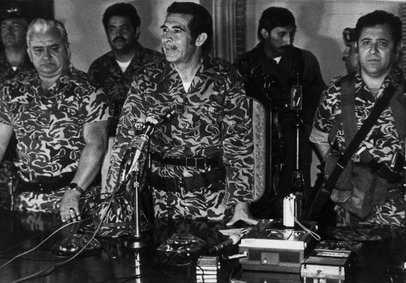
May 10, 2013 | News
La CIJ celebra que el proceso contra el General Efraín Rios Montt (center on the photo) por Genocidio y Delitos contra los Deberes de Humanidad haya concluido el viernes 10 de mayo en la ciudad de Guatemala.
La CIJ observó el debate por medio del abogado Miguel Moerth y apoyó proceso y el debido cumplimiento del Derecho Internacional de los Derechos Humanos y del Derecho Internacional Humanitario por medio del peritaje presentado por el Director de su oficina para Centroamérica.
Dicha oficina se ha mantenido atenta y ha abogado por el derecho de las víctimas a la verdad y la justicia.
Durante el proceso la CIJ llamó la atención sobre el uso abusivo de la figura del amparo, recusaciones, incidentes y otros recursos presentados por la defensa que pretendieron en diferentes momentos anular u obstaculizar el desarrollo del juicio.
La CIJ respalda decididamente al Tribunal de Mayor Riesgo “A” por haber llevado a cabo su difícil tarea, con respeto a las normas del debido proceso y la garantía del derecho de defensa de los acusados y, por haber resistido con las presiones recibidas durante el juicio, que incluyeron amenazas contra integridad personal de miembros del Tribunal.
La CIJ considera que el derecho de las víctimas a un juicio justo e imparcial y a conocer la verdad de los hechos, ha sido respetado con las acciones llevadas a cabo durante el juicio por dicho Tribunal.
Wilder Tayler, Secretario General de la Comisión Internacional de Juristas expresó: “Celebramos este triunfo de la Justicia sobre la Impunidad. Después de 30 años y de tanto esfuerzo, el derecho a la justicia de las víctimas ha sido respetado; la sociedad guatemalteca ha dado un primer y muy importante paso en el camino hacia la reconciliación. Esta sentencia fortalece el Sistema de Justicia en Guatemala y constituye un importante precedente para evitar que crímenes tan graves puedan repetirse. Constituye igualmente un ejemplo para toda la región americana en su combate contra la impunidad”.
Photo: Bettman/Corbias
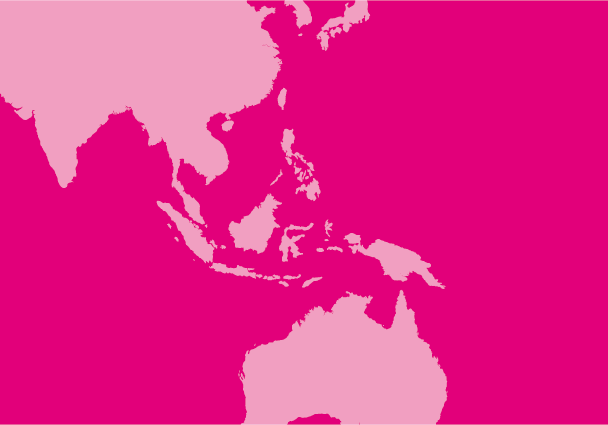
Apr 20, 2013 | Advocacy, News, Non-legal submissions
The ICJ today condemned the execution by the Government of Taiwan of six prisoners, convicted on charges of murder, on 19 April 2013. It follows the earlier execution of six convicted persons in December 2012.
Twenty-one executions have been carried out in Taiwan since April 2010, shattering a de facto moratorium of the death penalty that had been respected by the Government since December 2005.
“The Government of Taiwan’s execution of 12 people in the last six months constitutes a serious and unacceptable assault on the right to life and human dignity”, said Alex Conte, Director of the ICJ International Law & Protection Programmes. “These executions also place Taiwan at odds with the international community, which has adopted with increasingly large majorities since December 2007 the UN General Assembly resolutions calling for a worldwide moratorium on executions”, Conte added.
This new round of executions are especially lamentable in light of the encouraging step recently taken by the country to invite an international group of experts to review the measures adopted by the Government to promote and protect human rights. The recommendations to the Government of Taiwan, formulated by those experts, and welcomed by the ICJ and other rights groups, included intensifying efforts towards the abolition of capital punishment and the recommendation that Taiwan “as a first and decisive step, immediately introduces a moratorium on executions in accordance with the respective resolutions of the UN General Assembly”.
The ICJ believes that the use of the death penalty constitutes a violation of the right to life and the right not to be subjected to cruel, inhuman or degrading punishment.
ICJ and other rights groups encourage Taiwan on domestic implementation of human rights (see ICJ and other rights groups’ statement on Taiwan’s human rights review process)









